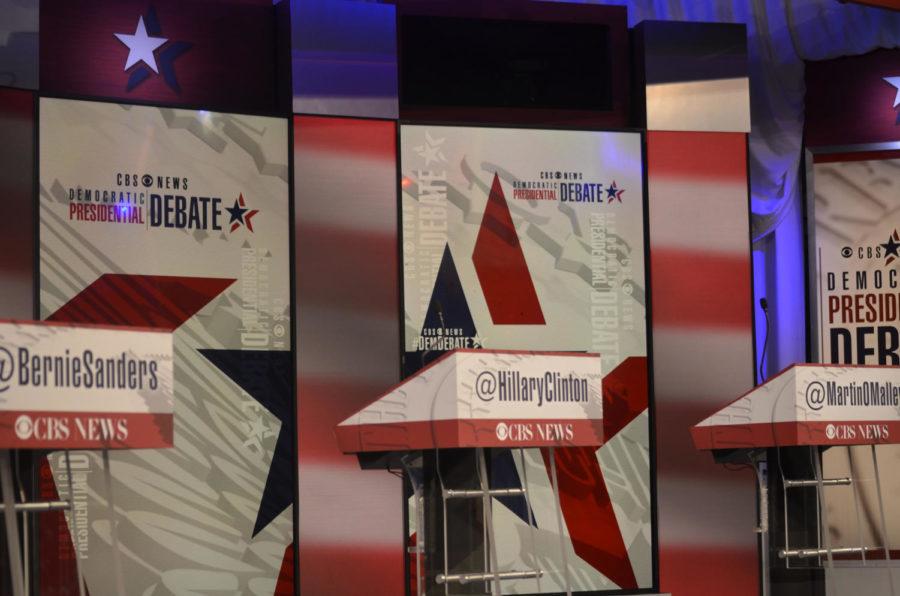Half of Democratic field remains in race despite failing to qualify for debate
Katy Klopfenstein/Iowa State Dai
Podiums for the Democratic presidential debate Nov. 14, 2015, at Drake University.
September 3, 2019
When ABC and the Democratic National Committee (DNC) announced the 10 candidates who qualified for the Sept. 12 debate, 10 other candidates actively seeking the Democratic presidential nomination were left off the stage.
Businessman Tom Steyer and Rep. Tulsi Gabbard have fulfilled one of the two criteria necessary to qualify for the debates set for Oct. 15 and 16 if more than 10 candidates qualify. All candidates who qualified for the September debate automatically qualified for October.
However, that leaves eight candidates who are unlikely to qualify for the October debate and the media coverage that comes with it.
Sen. Michael Bennet, Gov. Steve Bullock, Mayor Bill de Blasio, former Rep. John Delaney, Mayor Wayne Messam, Rep. Tim Ryan, former Rep. Joe Sestak and author Marianne Williamson would need to receive an uptick in a number of qualifying polls to qualify for the October debate — and likely to remain viable in the Democratic primary.
Mack Shelley, Iowa State professor and chair of the political science department, said candidates who are personally wealthy, like Steyer and Delaney, can continue to self-fund their campaigns whether they qualify for the debates or not, and if they cannot afford to self-fund they’re probably going to “fall by the wayside.” He added “ego” is probably part of why there are so many candidates in the race still.
“These are people who, for the most part, aren’t shy, and tend to have high opinions of themselves, and often with good reason,” Shelley said. “So I think there’s just a personal incentive to maintain your prominence as much as you can.”
Polls suggest the majority of likely Democratic caucusgoers in Iowa think several or most of the candidates seeking the Democratic nomination should drop out.
Shelley said candidates who remain in the race may be seeking appointments to cabinet roles or ambassadorships if their party wins the White House.
“There probably is more than one person in the group who — although they’d never admit it — probably are, really are strategizing to run for vice president,” Shelley said.
Several candidates who did not qualify for the debate and do not seem likely to qualify for future debates have railed against the DNC’s rules requiring them to receive at least two percent support in four approved polls and 130,000 unique donors from at least 400 donors in at least 20 states. These rules were announced in June.
After missing out on qualifying for the September debate, Bullock tweeted “[t]here are over 150 days before voters express their preference in Iowa and New Hampshire. It’s those voters in early states and across the country who will decide this election — no one else.”
There are over 150 days before voters express their preference in Iowa and New Hampshire.
It’s those voters in early states and across the country who will decide this election — no one else.
— Steve Bullock (@GovernorBullock) August 29, 2019
Ryan went on MSNBC’s Morning Joe to say “this race is just starting, not ending” the day after he missed qualifying, and Gabbard said the debate qualifying process “lacks transparency,” despite the qualification rules being announced well in advance of their deadline.

















